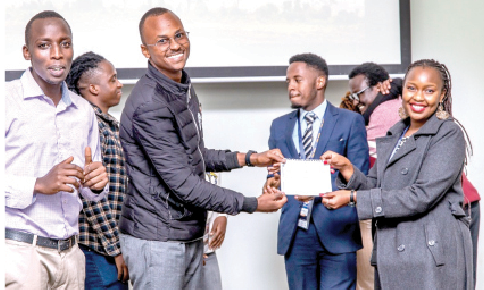Streamlining elections with AI, blockchain tech

Most elections are usually marked with complaints of systematic electoral fraud, including vote rigging, ballot box stuffing and election officials changing results. This is not an isolated case seen only in Kenya, but all across Africa and many other countries around the world. This consequently has had a divisive impact on the outcome of elections in the concerned nations, and in the worst-case scenarios, bloody wars have broken out because of disputed electoral results. Here in Kenya, the post-election violence of 2007/08 portrays just how horrible such malpractices could be.
It’s such issues that made a group called Geeks, the winning team at the Law Tech Africa Hackathon 2022 competition that took place recently in Nairobi, create an Artificial Intelligence (AI) and Blockchain platform that tallies up cast votes accordingly, while also reconciling the voters count. This process would ensure the integrity of the electoral vote counting process. The contest ran under the theme “Streamlining the election process”, and the team purposed to build an end-to-end system that aimed to do away with much of the human workforce in the entire election process mainly focusing on the vote-counting process.
Collective of minds
“Based on the theme, we asked ourselves, what could be done to minimise the human labour involved in the vote counting process and improve the integrity of a country’s electoral process? We had just a few minutes to come up with a working tech solution for the issue,” says Keith Martin, the team lead who is also a Machine Learning engineer at the Artificial Intelligence Centre of Excellence (AICE).
The other team members include Solomon Kimunyu, also a Machine Learning engineer at AICE, Grishon Ng’ang’a (a software engineer at Adanian Labs), advocate Julius Miiri, Afandi Inditsi (a data scientist), Celine Bowen (a software engineer) and data analyst Neil Aming’a.
The work process
It took the team 20 hours to create a prototype of the solution from ideation to actualisation, which will be presented at the annual IndabaX 2022 in Tunis, Tunisia, in December. The gathering helps develop knowledge and capacity in Machine Learning and AI in individual countries across Africa.
For the IndabaX, the KenyaX Lawyers hackathon team has built a Minimum Viable Product (MVP) to demonstrate the viability of this proposal. This constituted an android app to act as the high precision scanner for scanning a voter’s ballot paper, an AI model that extracts votes from ballot papers, a Smart Contract on Polygon’s blockchain that records each voter’s vote and a reporting dashboard to stream the votes in real time.
“The AI part employs computer vision that’s responsible for scanning the ballot papers and sending the results to a blockchain system then to a dashboard where the results are displayed in real-time. Employing blockchain in our solutions means that the results are completely immutable, therefore enhancing transparency. Actualising this solution means the true meaning of democracy would be realised,” continues Keith.
How it works is that all registered voters, candidates and political positions information would be stored on the blockchain. Voters would have to be verified through their biometrics before proceeding to voting, as is the case in most countries.
He explains, “Voting would still be done through the ballot papers. That would later be scanned by our high precision scanning devices. The voter’s vote would be fed to our AI system that would extract the vote from the ballot paper and instantaneously record it on the blockchain.
This would not only be tamper proof and verifiable, but also makes it impossible for any specific voter to repeat the voting. The system would be real-time, transparent while ensuring privacy, security, accountability and most importantly enhancing integrity of the electoral process.”
The final aspect of the system would be a reporting dashboard that would allow anyone to view real time results of the votes cast in the election. This system would not just be used in streamlining the vote counting process, but also can be implemented in other sectors, among them education for marking of examinations, thus having a potential of scaling and generating revenue and creating a sustainable business.
Proud to innovate
Keith is glad that he has been able to work on something that would create impact in the society. Since his days at Jomo Kenyatta University of Agriculture and Technology, he has always desired to solve problems using data to give accurate results. Just before completing his university studies in 2018, he got his first job at Dukaree Innovation Ltd and then moved to AICE about three months ago.
While the sweetness of using technology in elections is mostly portrayed in its accuracy, speed, scalability and anonymity, there are still challenges when it comes to this. Computers still rely on human beings to feed them with data, which creates a loophole for results manipulation.
Keith believes that their app is the solution to this challenge, as it has the capability to solve election malpractices in vote counting. “Implementing blockchain tech is a guarantee that the number of votes cannot be manipulated. Also, using through this technology, we have reduced the margin of human error by implementing a computer vision model that is able to automatically capture the candidate voted for,” he explains.







